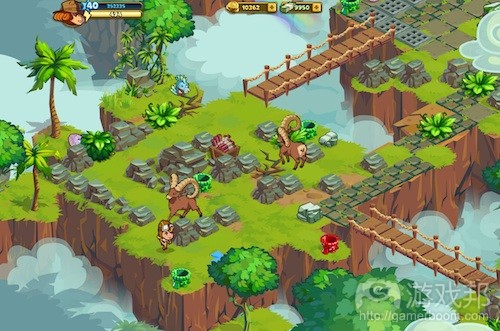分析Zynga发展已达瓶颈状态的4大原因
作者:Patrick O’Luanaigh(Playstation等平台游戏发行商、开发商nDreams公司CEO)
1、Zynga已变得过于贪婪
如果体验过该公司最近发布的游戏《Adventure World》就会明白这一点。玩过数天之后,就会迅速发现如果不付钱你每天几乎玩不到4分钟的时间,那些没有许多好友正在玩游戏的玩家更是如此。《Cityville》和《Farmville》中并没有出现这种状况。从这个层面上来看,《Empires and Allies》表现情况稍微差点,但是仍然可以从中寻得乐趣。但是《Adventure World》经常让人产生挫败感以至于放弃游戏。
Zynga道具的售价似乎也有了极大的提升,几乎接近荒谬的程度。当你开始期望普通玩家花大量金钱来避免游戏中的惩罚,那么这种做法则会与游戏的初衷相去甚远。
我认为,每款游戏都有个“相对平均价值”,我将其定义为普通玩家认为每月可以在该游戏中花费的金额。有些玩家会花更多钱,有些玩家花得比较少(游戏邦注:但大部分免费游戏玩家则是一文不花),但是总有个玩家认为相对合适的平均价值。我不认为Zynga准确把握了这个概念。
看看iPhone游戏《Tiny Tower》,这款游戏获得了巨额盈利,但是也为玩家提供了大量免费的内容,不会让人觉得“过于贪婪”。这便是我认为社交游戏应当考虑的事情:让玩家以自己认为舒适的方式来玩游戏,而不是强迫他们以某种方式来玩游戏。首先要遵守的原则便是,玩家应当从游戏中获得乐趣。随后,当你拥有了数百万能够获得乐趣的玩家之后,就可以鼓励他们购买道具,使得游戏进程更好、更快和更容易。而Zynga追求的似乎并非是“玩家应当获得乐趣”这个准则,而是“只有每月花费30美元的玩家才该获得乐趣”。我不认为这种理念是正确的。
2、Zynga已经停止成长
尽管收购了大量Facebook游戏开发商,但是Zynga今年的独立用户总数却没有增加。他们的玩家数目已经达到了平稳时期。我还未曾发现该公司将来的用户量增长来源在何处。
3、用户的“游戏后悔综合征”
我认为,优秀的游戏能够在玩家不玩游戏时让他们产生温馨而积极的感受。玩家应当在离开游戏时为他们在游戏中投入的时间和金钱感到高兴。这样方能构建起品牌忠诚度。我曾听过许多人表示,停止玩Zynga游戏时感觉是种解脱,并为自己在游戏中花费的大量时间和金钱感到震惊。我认为长此以往这种感觉会影响到游戏的用户留存率。
4、玩家青睐更具互动性的游戏
对于许多社交游戏玩家而言,《Farmville》之类的游戏是他们玩过的首批游戏之一。许多此类玩家现在追寻更具互动性的游戏玩法,因而社交游戏似乎进入了传统游戏开发者更加擅长的领域。Zynga凭借《Adventure World》勇敢地进入这片领域,却由于添加与之前游戏相比过于严格的时间、能量限制而摧毁了整个游戏。在我看来,这并非更具互动性的游戏。我认为Zynga理解他们在哪些方面较为出色,但是他们可能并不理解行业的发展方向。
免费游戏的四项准则
我并不是说免费游戏已经发展到巅峰。如果Zynga进行IPO,我不会购买他们的股份。我更情愿将资金投向Bigpoint、Innogames和Jagex之类的公司。事实上,与Zynga相比,我更愿意对其他制作在线游戏的公司进行投资。
以下是我认为免费游戏应遵从的四项准则:
1、不要过于贪婪。
2、让玩家在停止玩游戏后感到快乐,而不是遗憾。这意味着需要尊重玩家,避免使用成瘾性的心理学准则。
3、创造让游戏设计变得更好的可购买道具。不要让道具影响游戏质量,也不要使用游戏设计强迫玩家购买道具。
4、让玩家根据自己的喜好来玩游戏。如果他们想要的话,可以随时在游戏中投入1个小时或更多的时间,或者每天只玩少数时间。只要他们最终能够产生盈利,那么你应当给他们充分的自由。(本文为游戏邦/gamerboom.com编译,如需转载请联系:游戏邦)
FOUR REASONS WHY I THINK ZYNGA HAS PEAKED
Patrick O’Luanaigh
1) Zynga have become too greedy
Playing their latest release Adventure World illustrates this – after a couple of days, it rapidly became impossible to play for more than 4 minutes a day without payment, particularly if you don’t have lots of friends playing the game. With Cityville and Farmville this wasn’t the case. Empires and Allies was worse in this respect, but still enjoyable. But with Adventure World it simply becomes frustrating to the point of giving up.
Zynga’s item costs also appear to have risen hugely, and are approaching ridiculous levels. Their continued focus on revenue above fun/fair value is rebounding on them. When you start expecting the average player to spend large amounts of money just to avoid the game being crippled, things have gone too far.
I believe that every game has a ‘fair average value’ which I’d define as the amount that the average player feels is about right to spend on that game each month. Some players will spend much more, some less (and many will pay nothing in a free-to-play model), but there is a fair value that feels right for an average median player. I simply don’t believe that Zynga get this concept.
Check out Tiny Tower on iPhone which is making huge revenues but gives players lots for free and doesn’t feel ‘greedy’. This is where I believe social games are heading – let players play how they want to play, not how you want them to play. The number 1 rule has to be ‘players should have fun’, and then when you have millions of people having fun, encourage them to buy items to make things better, quicker, and easier. Rather than ‘players should have fun’, Zynga seems to be moving towards ‘players who spend more than $30 a month should have fun’. And I don’t think that is the right approach.
2) Zynga have stopped growing
Despite acquiring lots of Facebook developers with existing users, Zynga’s total number of unique users this year hasn’t risen. Their player numbers have plateaued. I simply don’t see where their growth is going to come from. Check out the latest figures, charts and financials from Zynga and see for yourself.
3) The ‘I can’t believe that game took over my life’ syndrome
I believe that great games leave the player with positive warm feelings when they stop playing them. Players should walk away feeling glad they committed time to the game and feeling happy they spent the money on that game. That’s how you build brand loyalty. I’ve heard too many people who stop playing a Zynga game talk about a ‘sense of relief’, a shock about how much time it had taken and how much money they’d spent. I don’t think this bodes well for retention of players in the long term.
(Editorial note: See Whales, True fans and the ethics of free-to-play for an understanding of how to avoid this issue)
4) The trend towards more interactive gameplay
For many social gamers, games like Farmville were one of the first games they had ever played. With many of these players now keen for slightly more interactive gameplay, social games appear to moving towards territories that traditional game developers understand better. Zynga made a brave stab at this with Adventure World, yet destroyed it instantly by adding even tighter time/energy restrictions than previous games, which is entirely the wrong direction for a more interactive game in my view. I think Zynga understand where they are brilliantly. I’m not convinced they understand where things are moving.
Four principles for free-to-play
I’m definitely NOT saying that free-to-play has peaked. If Zynga IPO, I won’t be buying shares. I’d rather invest in companies like Bigpoint, Innogames and Jagex. In fact, I’d rather invest in almost any other games company making online games other than Zynga at the moment given their huge valuation.
On the back of this, here at nDreams, we’re embracing four principles for our free-to-play games:
Be generous, not greedy.
Leave people feeling happy when they stop playing the game, not regretful. This means treating players with respect and avoiding using psychological principles of addiction.
Create purchasable items that make the game even better than the original design. Don’t make the game worse after it has been designed, then force players to buy items to make it playable again.
As far as possible, let players play how they want to play. Give them ways to spend an hour or more on your game at any time if they want to, or to play in short chunks each day. As long as they end up generating revenue, you should give them as much freedom as possible to play in a way that suits them. (Source: Games Brief)









































